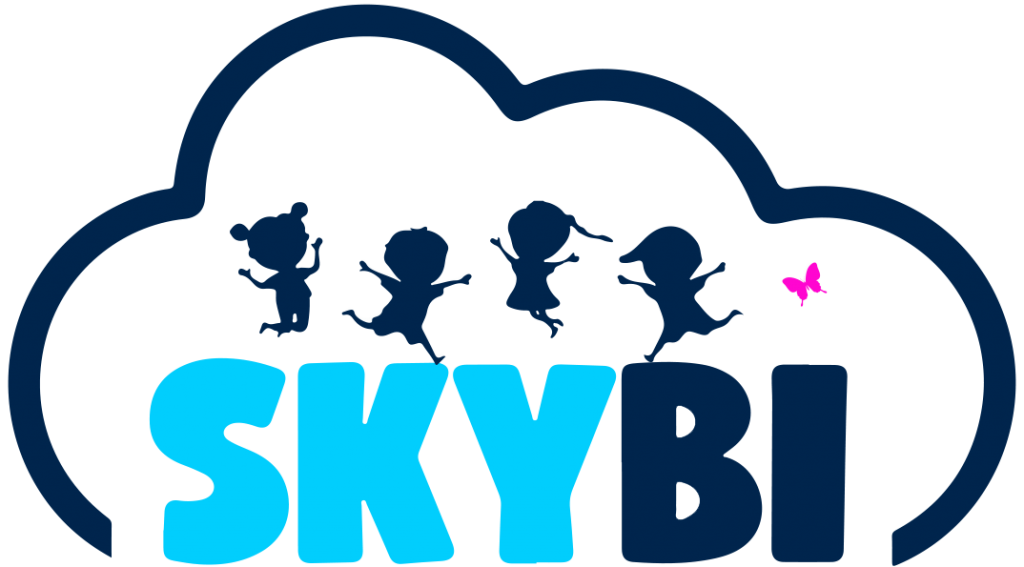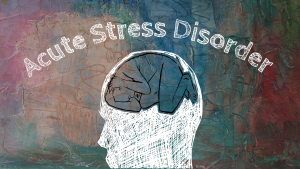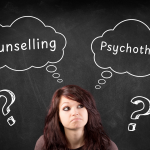13-9, 2 Rio Tower, Persiaran Rio, Bandar Puteri, 47100 Puchong, Selangor, Malaysia.

10 Early Signs of Post-Traumatic Stress Disorder You Shouldn’t Ignore
- On
- InUncategorized
Trauma doesn’t always leave visible scars. For many, the real wounds are carried silently in the mind and heart. Long after a painful event—such as the pandemic, an accident, or the loss of a loved one—you may still find yourself replaying it, avoiding reminders, or feeling constantly on edge. These could be early signs of post-traumatic stress disorder (PTSD), a condition many people overlook until it deeply affects their daily lives.
So how do you know if it’s just ordinary stress symptoms or something more? In this article, we’ll explore the early signs of PTSD, why recognising them matters, and where to find safe, supportive help in Malaysia.
What Is Post-Traumatic Stress Disorder (PTSD)?
PTSD is a mental health condition triggered by experiencing or witnessing a traumatic event. While it’s often associated with war veterans, it can affect anyone—including those who have lived through the pandemic, lost loved ones suddenly, or experienced abuse, medical trauma, or accidents.
In Malaysia, conversations around PTSD remain limited, and stigma often delays people from seeking timely help. Many assume they just need to “toughen up” or that their struggles aren’t serious enough. But PTSD isn’t about weakness—it’s about how your brain and body respond to extreme stress.
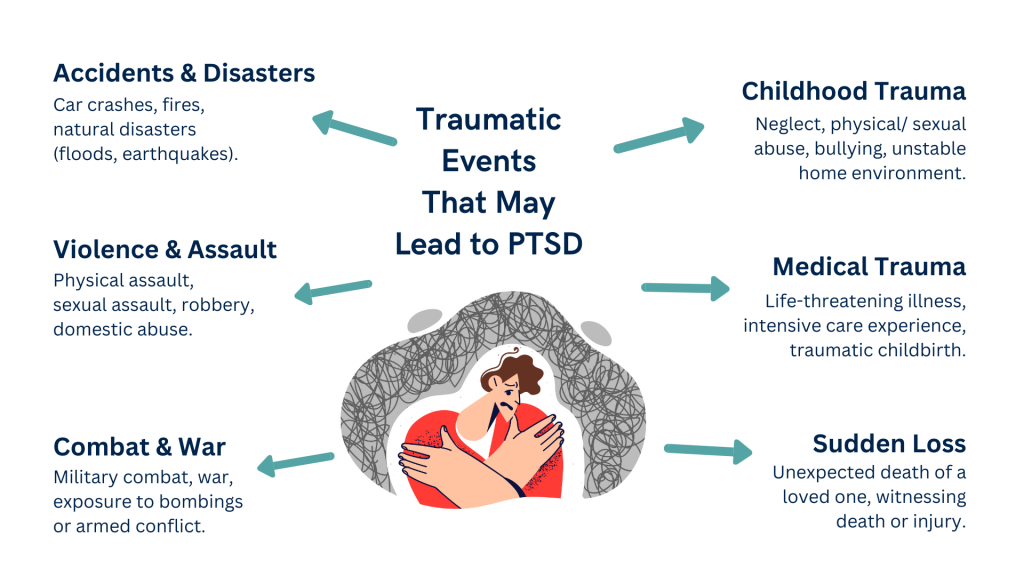
Why Recognising Early Signs of PTSD Matters
Catching the signs of PTSD early can make a huge difference. PTSD often doesn’t appear alone—it can increase the risk of depression, anxiety, substance use, or physical issues like chronic pain (Bryant, 2022; Strelchuk et al., 2022). Because its symptoms often resemble common stress or burnout, many people dismiss what they’re going through.
Recognising patterns isn’t about labelling yourself—it’s about taking the first step toward healing. Awareness opens the door to recovery.
10 Early Signs of Post-Traumatic Stress Disorder
- Intrusive Thoughts or Flashbacks
Reliving the event unexpectedly, as if it’s happening all over again.
- Nightmares or Sleep Disturbances
Difficulty falling asleep, restless nights, or recurring dreams about the trauma.
- Avoidance Behaviour
Avoiding people, places, or conversations that remind you of the event.
- Emotional Numbness
Feeling detached, disconnected, or unable to experience joy.
- Hypervigilance
Being constantly on guard, easily startled, or unable to relax.
- Irritability or Anger
Sudden outbursts or frustration without clear reasons.
- Difficulty Concentrating
Trouble staying focused, memory lapses, or mental fog.
- Persistent Guilt or Shame
Blaming yourself for what happened, even when it wasn’t your fault.
- Physical Symptoms
Headaches, muscle tension, stomach issues, or chronic fatigue.
- Social Withdrawal
Pulling away from friends, family, or work activities
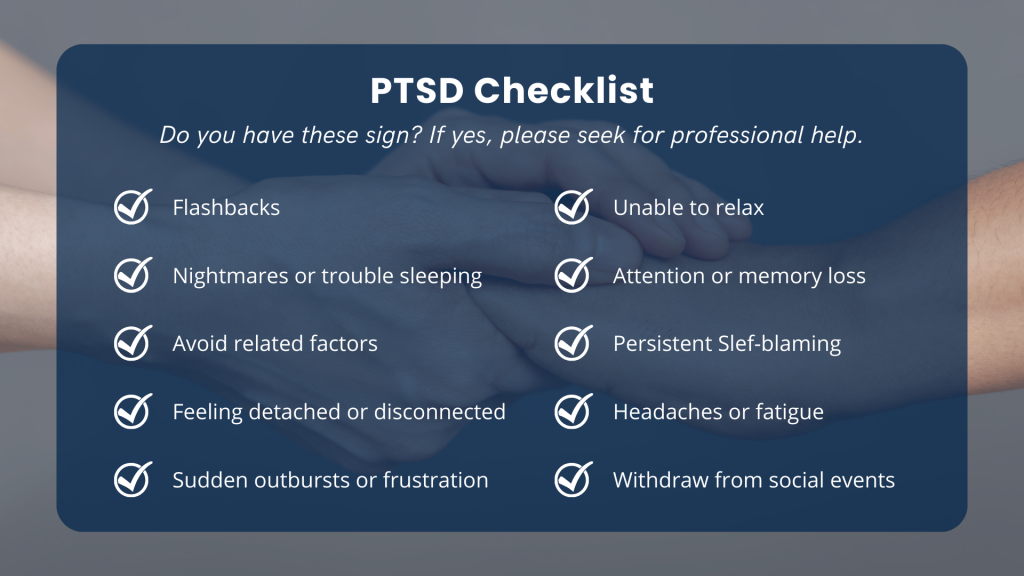
Are These Just Stress Symptoms or PTSD?
It’s normal to feel stressed after a difficult event. Symptoms such as irritability, fatigue, or insomnia can affect anyone. The difference is that with PTSD, symptoms are often:
How Schools Can Promote Mental Health Awareness
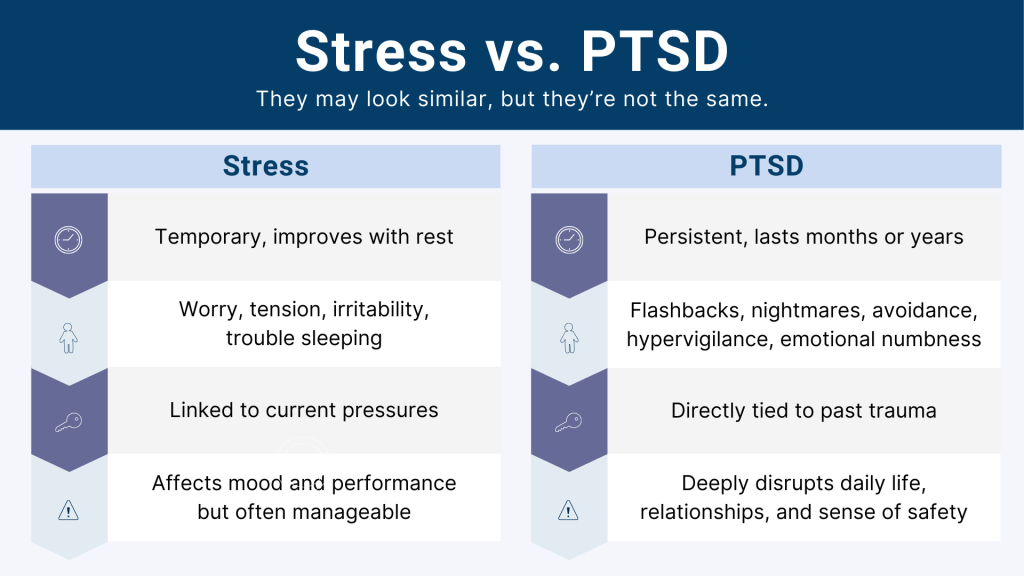
👉 If symptoms don’t fade with time—or grow more intense instead of improving—PTSD may be the underlying issue.
Not everyone who experiences trauma or grief will develop PTSD, but if these signs feel familiar, reaching out for support can make a big difference.
What You Can Do If These Signs Feel Familiar
Recognising the signs is just the beginning. Here are resources in Malaysia you can turn to:
📞 Befrienders Malaysia – 24/7 emotional support hotline: +603-7627 2929
🏥 Government hospitals & Klinik Kesihatan – Referrals to psychiatrists, psychologists, and counsellors
🌐 Online platforms – Confidential counselling and trauma-informed care (e.g., Skybi)
👥 Support groups – Peer support through NGOs and community centres
📝 Self-help practices – Journaling, grounding techniques, and mindfulness for daily regulation
💡 Remember: PTSD is treatable. Seeking help early can prevent symptoms from worsening and help you rebuild resilience.
When to Seek Help and What Recovery Can Look Like
If your symptoms are disrupting your daily life, relationships, or work, it may be time to seek support. PTSD is treatable, and with the proper care, healing is possible.
Effective treatments include:
- Trauma-informed therapy – A safe space to process your experience
- Cognitive Behavioural Therapy (CBT) – Reframes unhelpful thought patterns
- Eye Movement Desensitisation & Reprocessing (EMDR) – Reduces intensity of traumatic memories
- Support groups – Connection with others who understand your struggles
Recovery isn’t about erasing the past—it’s about regaining balance, compassion for yourself, and living fully in the present.
A Safe Place to Start: How Skybi Supports PTSD Recovery
PTSD is more common than many realise, but it doesn’t have to define your life. If these signs feel familiar, you don’t have to face them alone.
With Skybi, you can access:
✅ Private online PTSD assessments
✅ Licensed therapists offering trauma-informed care
✅ Personalised care plans designed for your needs
✅ A judgment-free, confidential space to share and heal
👉 Wondering if what you’re experiencing is more than stress symptoms? Skybi can help you find clarity. Our trauma-informed team is here to guide you with compassion and care.
👉 Take the PTSD & Trauma Assessment Now
💬 Prefer to talk? Chat with Skybi now for friendly, professional guidance.
written by Wei Xin on 21 August 2025, edited by Kai Lin on 22 Aug 2025
References
Bryant R. A. (2022). Post-traumatic stress disorder as moderator of other mental health conditions. World psychiatry: official journal of the World Psychiatric Association (WPA), 21(2), 310–311. https://doi.org/10.1002/wps.20975
Strelchuk, D., Hammerton, G., Wiles, N., Croft, J., Turner, K., Heron, J., & Zammit, S. (2022). PTSD as a mediator of the relationship between trauma and psychotic experiences. Psychological medicine, 52(13), 2722–2730. https://doi.org/10.1017/S0033291720004821
